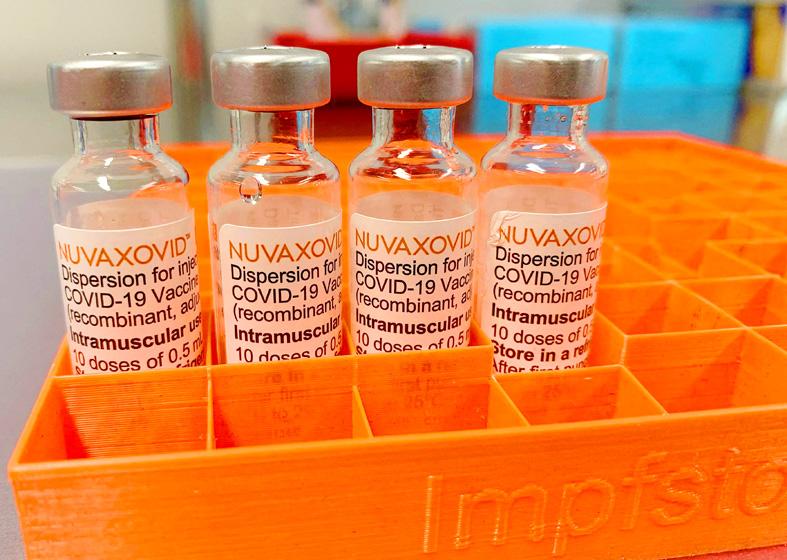The US is getting another COVID-19 vaccine choice as the US Food and Drug Administration (FDA) on Wednesday cleared Novavax shots for adults.
Novavax makes a more traditional type of shot than the three other COVID-19 vaccines available for use in the US — and one that is already available in Europe and multiple other countries.
Nearly one-quarter of US adults still have not received their primary vaccinations and experts expect at least some of them to roll up their sleeves for a more conventional option — a protein-based vaccine.

Photo: Reuters
The Maryland company also hopes its shots can become a top booster choice in the US and beyond. Tens of millions of Americans still need boosters that experts call critical for the best possible protection as SARS-CoV-2 continues to mutate.
For now, the FDA authorized Novavax’s initial two-dose series for people 18 or older.
“I encourage anyone who is eligible for, but has not yet received, a COVID-19 vaccine to consider doing so,” FDA Commissioner Robert Califf said in a statement.
Before shots begin, the US Centers for Disease Control and Prevention must recommend how they should be used, a decision expected next week.
Novavax CEO Stanley Erck said he expected the US to expand use of the vaccine beyond unvaccinated adults fairly quickly.
Already the FDA is evaluating it for those as young as 12, Erck said.
Novavax also has submitted data on booster doses, including “mix-and-match” use in people who had earlier received Pfizer or Moderna shots.
In related news, the European Medicines Agency (EMA) yesterday identified severe allergic reactions as potential side effects of the Novavax vaccine.
Novavax’s product label in the US warns against administering the shot to people with a history of allergic reactions to any components of the shot.
The EMA said it would also update the product information for the vaccine to add unusual or decreased feeling in the skin as a new side effect.
Only 250,000 doses of Novavax’s COVID-19 vaccine have been administered in Europe since its launch in December last year.

Airlines in Australia, Hong Kong, India, Malaysia and Singapore yesterday canceled flights to and from the Indonesian island of Bali, after a nearby volcano catapulted an ash tower into the sky. Australia’s Jetstar, Qantas and Virgin Australia all grounded flights after Mount Lewotobi Laki-Laki on Flores island spewed a 9km tower a day earlier. Malaysia Airlines, AirAsia, India’s IndiGo and Singapore’s Scoot also listed flights as canceled. “Volcanic ash poses a significant threat to safe operations of the aircraft in the vicinity of volcanic clouds,” AirAsia said as it announced several cancelations. Multiple eruptions from the 1,703m twin-peaked volcano in

A plane bringing Israeli soccer supporters home from Amsterdam landed at Israel’s Ben Gurion airport on Friday after a night of violence that Israeli and Dutch officials condemned as “anti-Semitic.” Dutch police said 62 arrests were made in connection with the violence, which erupted after a UEFA Europa League soccer tie between Amsterdam club Ajax and Maccabi Tel Aviv. Israeli flag carrier El Al said it was sending six planes to the Netherlands to bring the fans home, after the first flight carrying evacuees landed on Friday afternoon, the Israeli Airports Authority said. Israeli Prime Minister Benjamin Netanyahu also ordered

Former US House of Representatives speaker Nancy Pelosi said if US President Joe Biden had ended his re-election bid sooner, the Democratic Party could have held a competitive nominating process to choose his replacement. “Had the president gotten out sooner, there may have been other candidates in the race,” Pelosi said in an interview on Thursday published by the New York Times the next day. “The anticipation was that, if the president were to step aside, that there would be an open primary,” she said. Pelosi said she thought the Democratic candidate, US Vice President Kamala Harris, “would have done

Farmer Liu Bingyong used to make a tidy profit selling milk but is now leaking cash — hit by a dairy sector crisis that embodies several of China’s economic woes. Milk is not a traditional mainstay of Chinese diets, but the Chinese government has long pushed people to drink more, citing its health benefits. The country has expanded its dairy production capacity and imported vast numbers of cattle in recent years as Beijing pursues food self-sufficiency. However, chronically low consumption has left the market sloshing with unwanted milk — driving down prices and pushing farmers to the brink — while